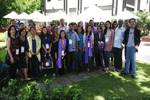Published on Thu, 2014-06-05 10:57
The premier international conference on public health policy is the World Health Assembly, organised by the World Health Organisation, which attracts Ministers of Health and other top health officials as well as non-governmental organisations to Geneva every year. This is where the latest trends in public health problems are presented and debated, and action plans for solutions are adopted. |
Published on Fri, 2014-05-30 09:33
Civil society groups from Asia and the Pacific met in Bangkok from May 15-17, 2014 to develop regional recommendations on just and sustainable development for action at the Asia Pacific Forum on Sustainable Development. The Asia Pacific region has seen rapid growth, and significant improvements in the lives of millions of people over the last decades but grave challenges remain. The region still has the largest concentration of people without adequate food, income and employment. Inequalities in the distribution of wealth, power and resources between and within countries, and among rich and poor, men and women, social groups, and current and future generations, are growing and undermining wellbeing for the majority of the population. |
Published on Thu, 2014-05-29 16:15
Before the world economy has been able to fully recover from the crisis that began more than five years ago, there is a widespread fear that we may be poised for yet another crisis, this time in emerging economies (EEs). Once again, most specialists on international economic matters have been caught unawares. In fact, the signs of external financial fragility in several emerging economies have been visible since the beginning of the financial crisis in the US and Europe. The South Centre has constantly warned that the boom in capital flows that had started in the first half of the 2000s and continued even after the Lehman collapse is generating serious imbalances in the developing world along with the danger of a sudden stop and reversal. |
Published on Thu, 2014-05-29 15:00
On Tuesday the 27th of May 2014, Mirjam van Reisen was interviewed by the Dutch newspaper the ‘Volkskrant’ concerning the human trafficking of Eritrean refugees. She explains that those in power in Eritrea richly profit from the human trafficking and even find ways to extort money from Eritrean refugees in Europe via taxation. In addition, it is likely that Eritrea also profits from the extortion of Eritrean families in Europe who pay human traffickers money in order to save their kidnapped relative. An incredible amount of money circulates within these human trafficking practices and estimations surpass 600 million Euro’s in the last 5 years alone. In order to protect Eritrean refugees and in the attempt to stop these criminal practices, Mirjam van Reisen advises to close all Eritrean embassies in Europe, to better secure refugee camps where refugees are kidnapped from, and to cooperate with refugees to reveal and capture those responsible for these criminal practices. |
Published on Thu, 2014-05-29 13:46
Every year the World Bank issues its Doing Business Report, which contains a ranking of each country’s business environment. In 2012, the President of the World Bank, Dr. Jim Yong Kim, appointed an Independent Panel of experts to review the report. The panel, chaired by South Africa’s Minister of Planning Mr. Trevor Manuel, appeared to be an opportunity to change the report for the better. The Panel, indeed, came up with substantive recommendations for an overhaul of the Doing Business. But most of them have been ignored. Those who understand the power of this report and its associated rankings to drive governments and give them the cover to put the interest of private companies ahead of the rights of working people and their families may win again if we don’t speak up. |
SUSCRIBE TO OUR NEWSLETTER







